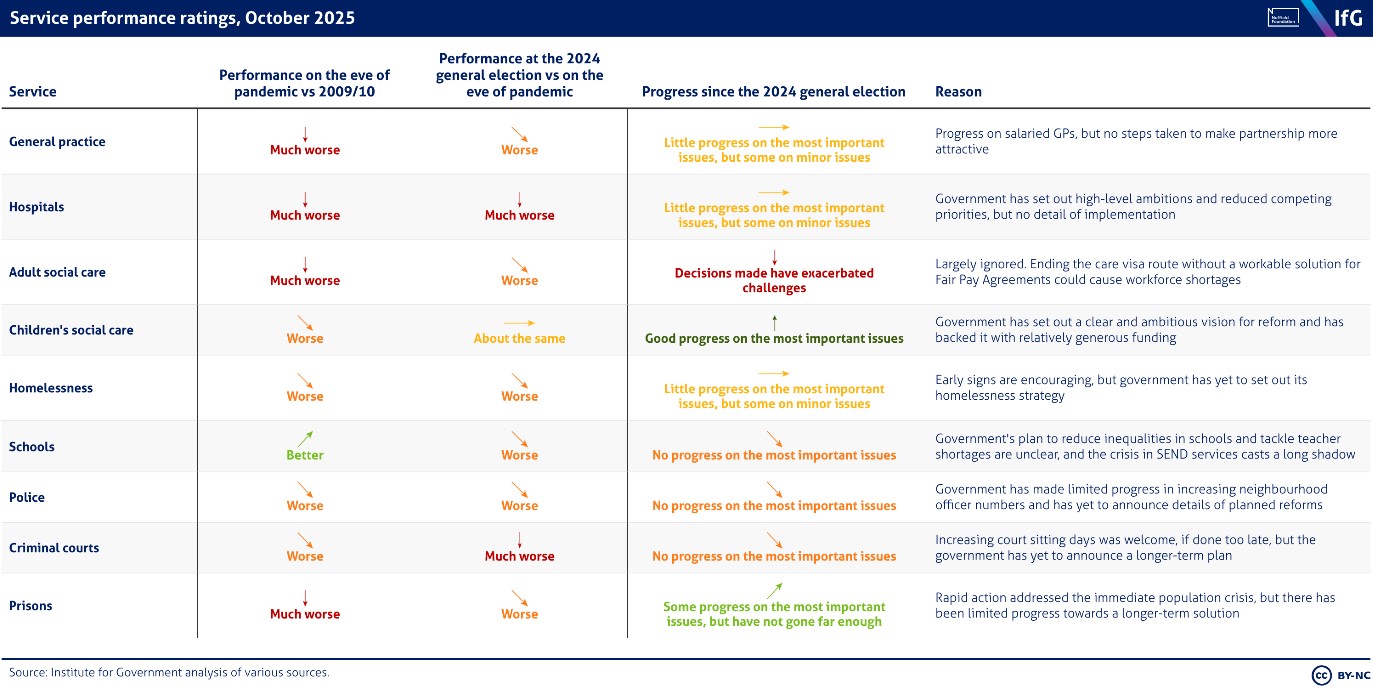Keir Starmer’s government has made far less progress with improving public services than it should have in its first 16 months in power and needs to up its game, according to a new report by the Institute for Government.
The IfG’s Public Services Performance Tracker 2025 finds that while Labour has taken some positive steps since its 2024 general-election victory, poor preparation in opposition and a lack of coordination across government has undermined its efforts.
The report, which was funded by charity the Nuffield Foundation, acknowledges that almost all public services were performing “much worse” when Labour regained the keys to 10 Downing Street than when the party was last in power in 2010. It said that schools were the only exception.
The Performance Tracker covers nine key service areas. While it notes some progress since Labour’s general-election win, it says the progress to date is not enough – and records “little to no progress” in six of those areas and a backwards step in one.
In relation to adult social care, the report observes that policy decisions on the part of the new government “exacerbated existing challenges”. It says the decision to end the care visa route without a workable solution for fair pay agreements could cause workforce shortages.
The report says the Starmer government deserves credit for stabilising crises in public-sector pay and prison overcrowding – and for setting out ambitious reform plans on local government finance, children’s social care and sentencing.
But it says no progress has been made on the main issues affecting schools, police reform and criminal courts, while only minor progress has been made with NHS reform and homelessness – when measured by the tracker’s performance ratings.
On hospitals, the report acknowledges the government has set out “high level ambitions” and reduced competing priorities, however it points to a lack of detail on implementation.
The report makes repeated reference to the impact of the period of austerity begun under the Conservatives and Liberal Democrats in 2010, and the negative effects of spending becoming more weighted towards acute services as deep cuts were made to preventative programmes.
It suggests that the Starmer government’s interest in reducing non-frontline staff could jeopardise service delivery.
“Labour also appears to be continuing the approach of cutting back-office staff to ‘slash unnecessary bureaucracy’,” the report says. “The risk of this approach is that rather than freeing up frontline staff, it will instead force them to spend more of their time on administrative tasks that could be better done by others.”
The government says its plans to reduce back-office costs by 16% over the next five years will deliver savings of more than £2bn a year by 2030 that can be targeted on frontline services.
 Image: IfG
Image: IfG
Among its recommendations, the report says Starmer must “urgently” establish a cross-government approach to public service reform, either by re-energising the missions drive or finding an “alternative mechanism”.
The IfG says public service reform plans should be “operationalised” and scaled up through incorporation into the government’s performance framework, making it easier for public services to share data, and ringfencing preventative spending.
The report adds that services should be supported to use their capital budgets more effectively with rolling five-year capital budgets, streamlining capital approvals processes and reconsidering the delegated spending limits of departments
A further suggestion is encouraging a higher proportion of capital budgets to be spent on maintenance.
Report author Nick Davies, who is IfG programme director for public services and outsourcing, said Labour had inherited public services “stuck in a doom loop” and that fixing them was never going to be a single-term project.
“The government deserves credit for stabilising the worst crises and initiating some promising long-term reforms but its overall record to date adds up to less than the sum of its parts,” he said.
“The failure to properly prepare in opposition can’t be undone but, if it acts quickly, the government can still deliver tangible improvements to public services over the rest of this parliament.”
Mark Franks, welfare director at the Nuffield Foundation, said next week’s Autumn Budget would be “defined by limited options for raising additional revenue” at the same time as public services continue to face significant pressures under tight financial settlements.
However, he said not all options for meaningful improvement required major new spending.
“Enhancing the quality and sharing of data, and ensuring it reaches decision-makers, can drive better outcomes,” he said.
“Other potential measures include protecting preventative investment, devolving greater tax and spending powers and prioritising maintenance of existing assets.”
Responding to the report, a government spokesperson said: "We are already delivering real change for people across the UK, including cutting NHS waiting lists, launching free breakfast clubs for school children and starting a £5bn Pride in Place fund for local leaders to improve communities and deliver national renewal.
“This government is significantly increasing investment in public services. Day-to-day spending will be over £50bn higher every year by 2028-29 and we've increased capital investment by over £100bn over the next five years.
“We are also working with local partners and public service providers, who know their communities best, to deliver change across the UK.”